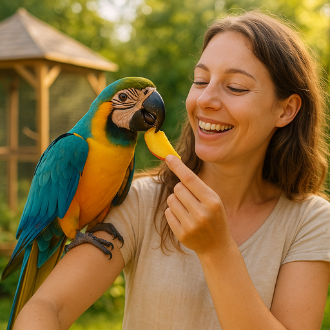The Fundamental Needs of Birds: Ensuring Their Well-being and Balance
By Lost'Him Team • February 21, 2025

Birds, whether parakeets, canaries, parrots, lovebirds, cockatiels, or finches, are sensitive and intelligent companions that require proper care and a stimulating environment. Unlike other pets, birds have specific needs related to their wild nature, flight instinct, and social behavior.
To ensure their physical and mental health, it is essential to understand their fundamental needs and provide them with an appropriate living environment. Here are the key aspects to consider for their well-being and happiness.
1. A Secure and Well-adapted Habitat
👉 A well-thought-out environment is essential for their comfort and safety.
- Choose a cage suitable for the bird’s size: Opt for a spacious cage that allows them to spread their wings and fly short distances.
- Avoid round cages: These disrupt their spatial awareness and cause stress.
- Use varied perches: Incorporate perches of different diameters made from natural wood (hazel, willow) to support foot health and encourage natural beak wear.
- Provide hiding spots and resting areas: Birds need a safe space to retreat and feel secure.
💡 A well-secured and adapted habitat reduces stress and promotes balanced behavior.
2. Regular Mental and Physical Stimulation
Birds, especially parrots, crows, and lovebirds, are highly intelligent. Without stimulation, they can become bored and develop behavioral issues such as feather plucking or excessive screaming.
👉 Enrich their daily lives with activities and games:
- Provide interactive toys: Ropes, swings, mirrors (in moderation), ladders, and puzzle games.
- Encourage foraging: Hide seeds and treats in cardboard tubes or exploration toys.
- Allow safe flight time: If possible, let them fly in a secure room for at least 30 minutes a day.
💡 A mentally stimulated bird is more balanced and less prone to behavioral problems.
3. A Balanced and Appropriate Diet
Proper nutrition is essential for a bird’s health, energy, and longevity.
👉 Provide a diverse and complete diet:
- High-quality seed mix: Millet, canary seed, flaxseed, sunflower seeds (in moderation to prevent obesity).
- Balanced pellets: Choose species-appropriate pellets to ensure optimal nutrient intake.
- Fresh fruits and vegetables: Carrots, broccoli, apples (without seeds), peppers, berries, zucchini. Avoid avocado, which is toxic to birds.
- Calcium and mineral supplements: Provide cuttlebone and mineral blocks.
- Clean and fresh water: Change the water daily and clean the dish regularly.
💡 A varied diet strengthens the immune system and promotes vibrant plumage.
4. Appropriate Temperature and Lighting
Birds are sensitive to temperature fluctuations and light exposure.
👉 Recreate natural conditions to maintain their health:
- Maintain a stable temperature: Keep it between 18°C and 25°C (64°F to 77°F).
- Avoid drafts and temperature shocks (especially in winter and summer).
- Ensure a natural light cycle: Birds need 10 to 12 hours of daylight per day.
- Use UVB lamps if needed (for birds with limited natural sunlight exposure).
- Provide a quiet sleeping environment: Keep them away from artificial lights and noise at night.
💡 Proper lighting and temperature support metabolism and biological rhythms.
5. Rigorous and Regular Hygiene
Birds are susceptible to bacterial, fungal, and parasitic infections.
👉 Implement an effective hygiene routine:
- Clean the cage daily: Remove droppings, food remnants, and feathers.
- Disinfect accessories: Clean perches, toys, and bowls with a natural, non-toxic disinfectant.
- Provide regular baths: Offer a shallow dish of lukewarm water or mist them with a spray bottle.
💡 A clean environment reduces the risk of infections and promotes healthy feathers.
Conclusion: Providing an Adapted Environment for Happy Birds
- ✅ A secure habitat: Spacious cage, varied perches, and safe hiding spots.
- ✅ Mental and physical stimulation: Toys, activities, and free-flight time.
- ✅ A balanced diet: Seeds, fruits, vegetables, pellets, and supplements.
- ✅ Proper lighting and temperature: Natural daylight, stable temperature.
- ✅ Strict hygiene maintenance: Daily cleaning and regular disinfection.
- ✅ Social interactions: With other birds and human caregivers.
- ✅ Regular flight opportunities: Even without an aviary, allow supervised indoor flight.
💡 A happy bird is one that flies, explores, plays, and interacts. Meeting these needs ensures a healthy and fulfilling life! 🦜💜
 EN
EN  FR
FR